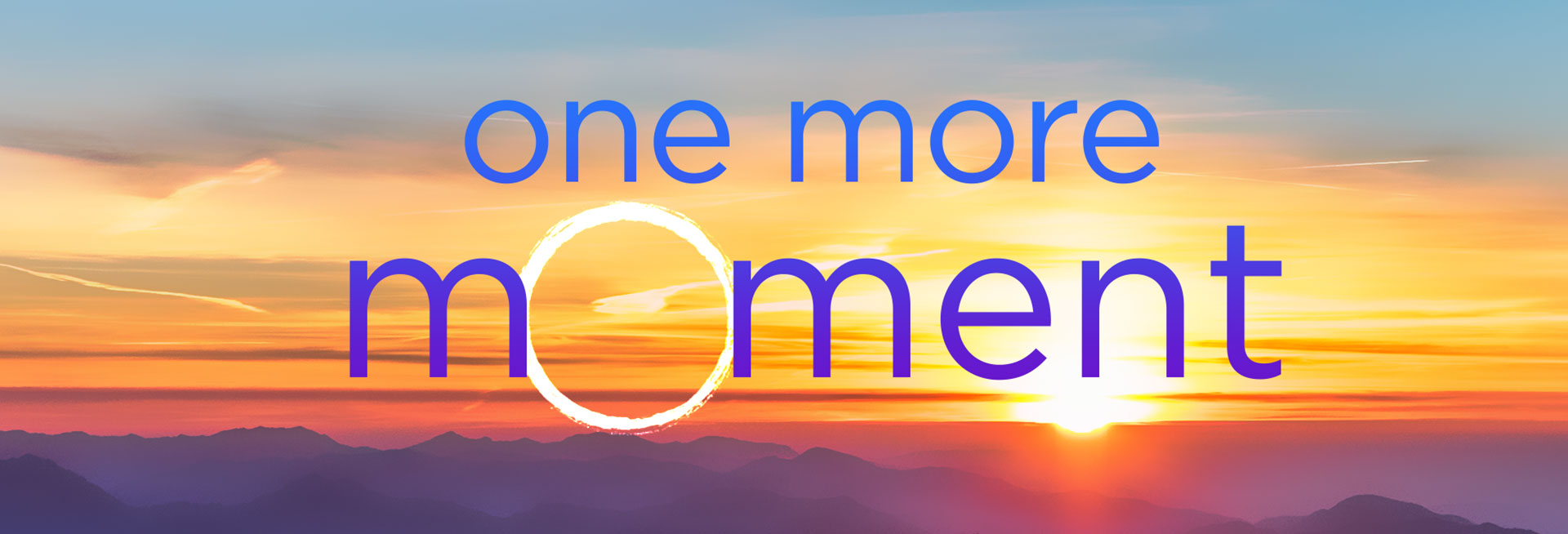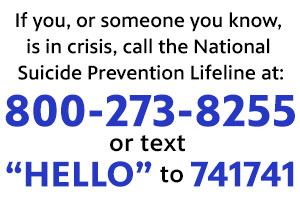Kay’s Story
-
Keira McGuire
“The more that we share our stories, then the more people feel safe to share their stories, to open up, to get the help that they need.”
-Kay Bela
Suicide Attempt Survivor
The following is a transcript of Kay Bela’s video story.
Hi, my name is Kay Bela, and I have dealt with depression and anxiety for most of my life, and I’ve also had suicide attempts as well.
I first experienced it when I was a pre-teen. It seemed like no matter what I did, I couldn’t just be happy or be relaxed. So, I felt empty and just kind of, I couldn’t even describe it at the time. It was just like this kind of void feeling.
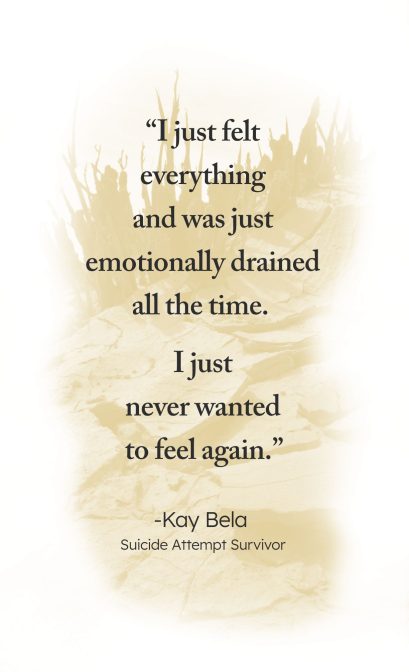 I was the fifth kid and my brother, Jonathan, I guess we were like six, six and half years apart. He was a goofball, the comedian class clown kind of guy. He didn’t really follow anybody else’s trail. And that’s how I see myself.
I was the fifth kid and my brother, Jonathan, I guess we were like six, six and half years apart. He was a goofball, the comedian class clown kind of guy. He didn’t really follow anybody else’s trail. And that’s how I see myself.
He was very protective of us, especially me. I adored him.
My brother was dealing with addiction issues, and so he was always in and out of rehab and jail and just was in a lot of issues. So, I feel like some of it was that there was a lot of tension surrounding that.
My brother actually passed away when I was 13.
He just drank too much and it ended up kind of destroying his insides. He was in a coma for a week and then he passed away. So it’s a great way to be invited into your teen years.
So I grew up with like a really deep perspective on things, whereas a lot of other people were focused on like money and jobs and boyfriends. And I was like, What’s the meaning of life and why are we here? And what’s the point of doing this?
I didn’t really vocalize a lot of what I was going through, especially to my family, because they’d already lost my brother, so I didn’t want them to worry about me.
So sometimes I was really anxious and snappy. Other times I was really depressed. Like I had cut, and that was part of the way that I relaxed because it just turned the pain into physical pain instead of that emotional internal pain.
And I sought counseling and it did not go well.
She encouraged me to get on medication. I really didn’t want to. And then basically after like two sessions after that, she was like, so you’re cured, you know, like, we don’t have anything to talk about.
And she, like, didn’t dive deep, you know, she didn’t ask about my brother. She didn’t…and so I just like was like, you know, I think we are done. If you think we’re done at this point and then I think we’re done.
So I didn’t seek counseling for a while and then it wasn’t until my crisis about seven years ago that I started really seeking somebody that could actually help.
I had just started teaching. Things just started to disintegrate. I started to drink more.
I was hospitalized for the first time for just alcohol and just went to the hospital because I drank too much.
I would drink just so that I didn’t feel. And then you just want to keep drinking. You’re just like I just never want to feel again.
I felt everything and just emotionally was drained all the time, so my intention was just not to wake up. And that’s what my brother had done. It was just like, I just didn’t, I didn’t want to feel.
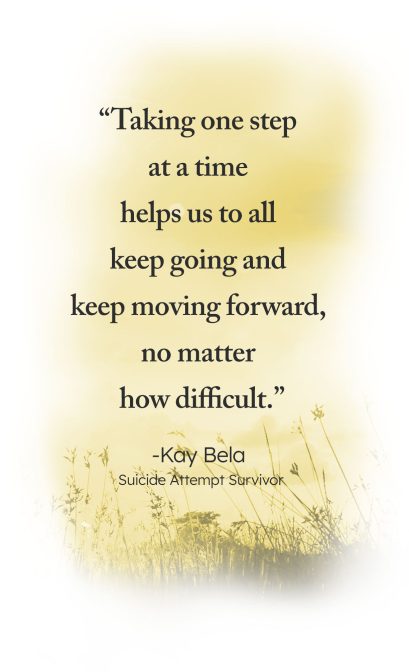 It was my neighbor that found me.
It was my neighbor that found me.
I was an inpatient for three days just in our hospital. It’s a temporary facility.
And then, that happened again, I think the next week. Again, it was like a three to five day stay.
And then from there they released me, but I went to see my therapist almost immediately after, and she talked to me about going to inpatient and checking myself in like to a longer-term facility.
Even in that state, I’ve been hospitalized twice, I was still saying that I was fine and that I didn’t really have a problem and that I could handle my situation.
That’s how used to this kind of crisis lifestyle I was in. I didn’t even see my own red flags.
And so I went there for a week. Medication management, art therapy groups, regular therapy groups, everything was really helpful, and I didn’t feel like I had to put on any kind of front or facade that I was OK and that I was fine. It was just, wow, all these people have dealt with the same thing. There’s no there’s no facade.
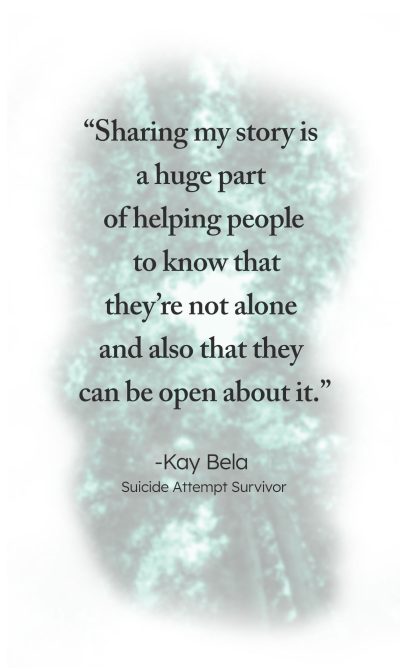 So I was in the hospital like at the beginning of November, I think it was and I met my husband on my birthday, which was December 11th, and I was like, “Stay away from me. I’m bad news right now, like, this is not good.”
So I was in the hospital like at the beginning of November, I think it was and I met my husband on my birthday, which was December 11th, and I was like, “Stay away from me. I’m bad news right now, like, this is not good.”
And he stuck around, and he saw me through the most difficult time of my life as I was coming out of that.
And then I was in counseling for about two years and then finally started to feel like I was in a place where I could take on something new. And that’s when I started looking at like physical health stuff.
Once I started to get healthier and started to work out and changed my nutrition, I realized how it’s affecting my mental health. And I was also learning to set boundaries with people and say no to things that weren’t good for me.
Today, life is a work in progress.
For me, sharing my story is a huge part of helping people to know that they’re not alone and also that they can be open about it. They can get help.
Then the more that we share stories, then the more people feel safe to share their stories, to open up, to get the help that they need.
I also felt just very alone growing up, and so to hear somebody else’s story would have been so refreshing to just be like, oh, somebody else gets it, and they’re not trying to just pretend that it doesn’t exist.
If I had one more moment with my brother, I would tell him that I’m sorry and that I love him very much, and I wish he could have gotten the help that he deserved in his life.
So one more moment to me is what I have to do each day. Just taking it one moment at a time, one step at a time, not trying to take on too much all at once, or look at the mountain in front of me. But instead, just taking one step at a time helps us to all keep going and keep moving forward, no matter how difficult.
One More Moment was developed with support from:

